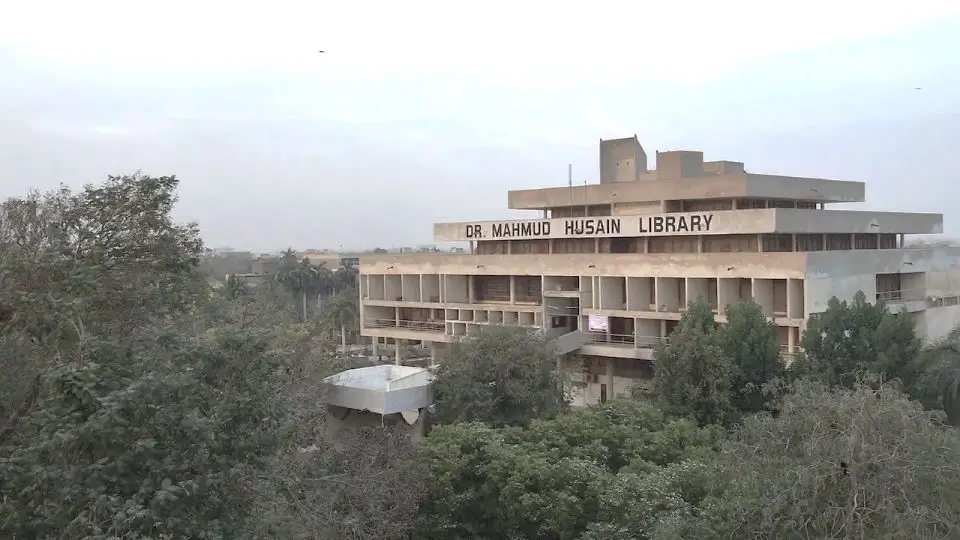In the heart of the city stands Karachi’s largest public sector academic institution, the University of Karachi, where knowledge blossoms and dreams take flight. Currently, it is home to more than 41,000 students from across Pakistan and around the world. Within its boundaries lies one of Karachi’s largest libraries, the Dr. Mahmud Hussain Library—a towering edifice of intellect and inspiration. This promising five-story structure, complete with a mystical basement, reflects the institution’s dedication to offering extensive resources and support to its diverse academic community. As a dynamic powerhouse of invaluable knowledge, this library is committed to supporting 57 departments, more than 18 research institutes, and numerous Master’s programs. Despite its potential to play a pivotal role in advancing research, learning, and academic success across the university, its true worth remains overlooked and underappreciated.
The Dr. Mahmud Hussain Library is a vital resource for researchers and students, offering an extensive collection of academic materials and historical archives.
The central library of the University of Karachi was founded in 1952, the same year the university was established; however, the library was later relocated to its current building in 1964. The Dr. Mahmud Hussain Library is named in honor of Dr. Mahmud Hussain, a pivotal figure in the Pakistan Movement and a key academic leader. As Vice-Chancellor of the University of Karachi from 1971 to 1975, he allocated fifty percent of the development grant to the central library—a landmark investment. The library was renamed in his honor in 1976, marking the first anniversary of his passing, to celebrate his significant contributions.
With its extensive collection of about 350,000 books, an equivalent number of scientific journals, 6,150 microfilms, 5,000 research reports, 20,000 documents, major census records, historical maps, and archives, the Dr. Mahmud Hussain Library stands as a testament to neglected treasure. It boasts a notable UN depository center and rare books in multiple languages, including 16th-century Qalmi Nuskhas buried under thick dust. The personal collections of 46 distinguished scholars and academicians also reside here, overshadowed by the library’s underappreciated condition.
The library’s neglect is a reflection of the broader issues facing Pakistan’s education system, including inadequate funding and infrastructure.
Among the Dr. Mahmud Hussain Library’s most prized assets is Quaid-e-Azam Muhammad Ali Jinnah’s personal collection, preserved in antique book cabinets. Donated by Jinnah’s family, it includes original copies of books that belonged to Mohammad Ali Jinnah, some bearing his signature, adding significant historical value to the library’s holdings.
Additionally, the Muslim League Section, a cornerstone of our heritage, holds vital pre-partition records, including foundational documents of the All India Muslim League. Acquired in 1966 on the directive of President Ayub Khan, this collection also features British-era newspapers like the Morning News, The Times of India, and Dawn, as well as local newspapers in Gujarati and Hindi. Despite their historical significance, these invaluable records remain at risk, their importance overshadowed by carelessness, even though they were meticulously transferred from Indian libraries to Karachi post-partition, enriching the library’s historical repository.
The audiovisual department of the library is in the most vulnerable condition, as interviews, lectures, and speeches of literary, political, and other renowned personalities on outdated audio and video cassettes remain largely neglected. A portion of these audio and video collections has been lent to national television PTV and Radio Pakistan on multiple occasions. Researchers and students rarely visit this section of the library, likely due to their unfamiliarity with accessing this valuable collection using obsolete equipment. These improperly preserved treasures demand immediate digitization; otherwise, much of it, already discarded, will soon be lost.
The library has the potential to become a hub for academic excellence and research in Pakistan, but requires investment and support.
The library’s outdated equipment, untrained staff, and obsolete software severely limit its capacity to meet the changing demands of its users in the present era of technology. The failure to allocate resources for essential hardware and software, combined with a lack of technical support, dedicated computers, and vendor assistance—despite multiple requests from the staff—highlights a glaring neglect by the concerned authorities. This oversight forces staff to perform tasks manually, emphasizing the critical gap in addressing the library’s technological shortcomings and its capacity to effectively serve its community.
The Dr. Mahmud Hussain Library, with its rich historical and academic treasures, remains a neglected gem, undermined by outdated technology and insufficient maintenance. This invaluable repository, featuring Quaid-e-Azam Jinnah’s personal collection and Freedom Movement archives, is all but ignored by students and visitors, with its precious remains largely unexplored by the present youth. The failure to modernize and properly preserve this national treasure reflects a profound oversight by the authorities. It is imperative that the people and decision-makers recognize and invest in its true worth to preserve and enhance its role in our collective heritage.
